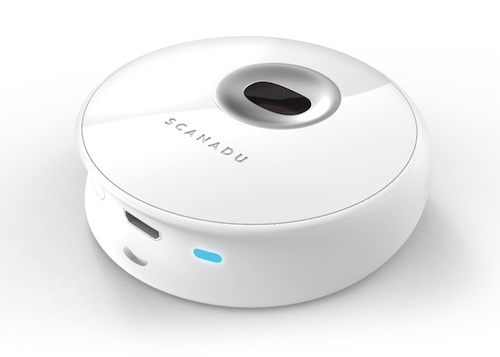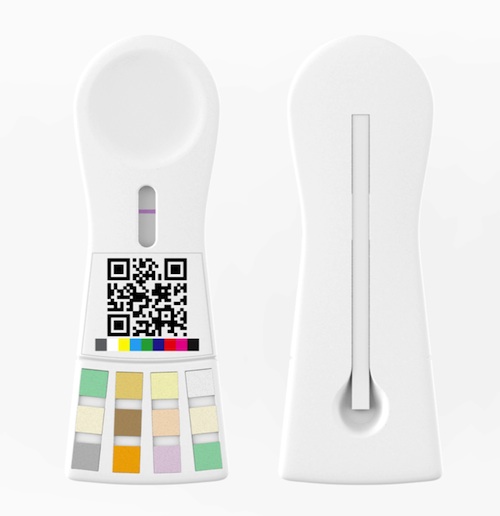
The updated Scanadu Scout.
San Francisco-based Scanadu, which had planned to release it's tricorder-like SCOUT device by the end of 2013, is launching an Indiegogo campaign to sell the device. In an unprecedented move, the company is launching its crowdfunding campaign without FDA 510(k) clearance, with the intention of conducting the usability tests needed to get the clearance via the campaign.
"It's sold as a research device for investigational use. Everyone who buys it is essentially a researcher in that project," Scanadu CEO Walter De Brouwer told MobiHealthNews. "I think that crowdsourcing and crowdfunding will give rise to a lot of new ways to look at business, manufacturing, and even legal aspects."
The usability study will also include a board of doctors, headed up by high-profile pediatrician and Scanadu chief medical officer Dr. Alan Greene. There are no requirements for participating funders except that they be willing to report on how the device functions once they get it. Although the device's design is more or less locked in, contributors' data will help the company fine-tune the scanning algorithms and provide them with information about feasibility, usability, and consumer friendliness. In addition, backers will have the option to opt in to clinical studies that Scanadu will set up in the future.
The Scout will sell for $149 (hitherto the company's target retail price) to the first 1,000 supporters, and for $199 to others, and will ship in the first quarter of 2014. In addition to discounted devices, perks in the campaign will include visits and tours of the NASA-Ames Research Center where Scanadu is based.
The device has been redesigned in several key ways since the prototype was unveiled last November. Though the company hasn't started selling the product yet, they have heard from potential consumers about their designs.
"People wanted not only to scan themselves, but also wanted to scan others, so they can talk about healthcare and give tips and tricks and take it on travels. So we decided to take a year to design it again on the bench, and we made alterations so they can also scan others," De Brouwer said. The old design of the device only worked on the person using it because it required making a closed circuit between the user's fingers and his or her temple.
The company also added additional sensors and upgraded from an 8-bit to a 32-bit processor. Additionally, the new Scout will run the Micrium operating system, the same OS used for sample analysis on NASA's Curiosity Mars rover. Aesthetically, the device has been tweaked and is now circular, rather than diamond-shaped.
ScanaFlo and ScanaFlu still on the way

The ScanaFlo urine test peripheral.
Meanwhile, the two peripheral devices Scanadu announced in November when it debuted its suite are also coming along the road to regulatory clearance, according to De Brouwer. The company just unveiled designs for the ScanaFlo, the company's urine testing peripheral. The device is a disposable paddle with a QR code printed on it. It will test for for levels of glucose, protein, leukocytes, nitrates, blood, bilirubin, urobilinogen, specific gravity, and pH in urine, as well as for pregnancy, and the readout will be integrated into the Scanadu Scout app.
The company has received 6,000 of the paddles from the manufacturer and is beginning clinical trials. They hope to submit for FDA 510(k) clearance at the start of July.
De Brouwer said the other product, a saliva-based influenza test called ScanaFlu, has to undergo its clinical trials during flu season, which puts it on a later timetable generally. The company plans to start large clinical trials for ScanaFlu -- with thousands of patients -- in October 2014.
On track for the X Prize
De Brouwer said Scanadu continues to be in good shape to meet the requirements of the Qualcomm Tricorder X Prize.
"For the moment, the X Prize consists of 3 layers," he said. "The first set is the vital signs. You have to measure three out of five, we measure five out of five, so we're completely ready. Then there's this set of diseases you have to choose from: there are 12 diseases, we can cover, with what we have in the lab and with separate sensors, we can cover seven. And then for the elective set, you have to choose three (additional conditions) and there we've covered two. So we are on track."
You can see the new video Scanadu put together for the crowdfunding campaign here.
UPDATE 9:15 AM: Just over one hour into the campaign, Scanadu has already raised 50 percent of its $100,000 funding goal.
UPDATE 10:15 AM: Entering hour three of the campaign, the company has already surpassed its funding goal. About half of the discounted Scouts are claimed.
Want MobiHealthNews in your inbox? Sign up for our twice-weekly newsletter -- it’s free!


















